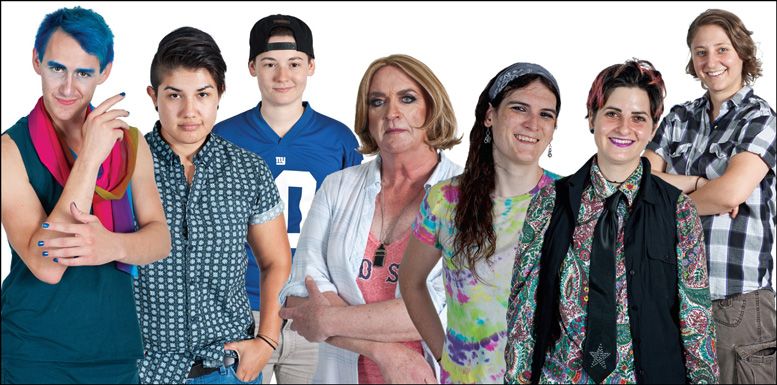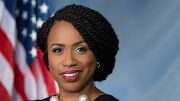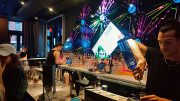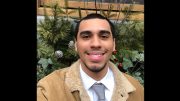By: Alex Mancini/TRT Photographer—
Tuesday, October 11 is National Coming Out Day, a time for members of the LGBTQ community to embrace their identities and, most importantly, show love, compassion, and empathy towards each other.
In this two-part series, The Rainbow Times will explore transgender identities, specifically people who identify as non-binary. This series highlights the courageous contention that beauty cannot be limited to binary identities and traditional, cisgender, heteronormative standards.
***
Andy DeStefano
Age: 27
Preferred Pronouns: He/Him/His
Lives in Somerville, Mass.
Q: What does having a non-binary identity mean to you?
Growing up, I always felt like I identified as masculine, but transgender and non-binary weren’t ideas I was really familiar with. Even though today I prefer him/his pronouns, in a lot of ways I am [the] same person that I’ve always been, I just use different words to describe the same person. If anything, I am a more authentic version of myself now that I can be more open with the people I know. Currently, I’m even in the process of finding what works best for me. I think having a gender identity outside of what is considered “the norm” helps to spread awareness and make others feel less alone. It has been reported that non-binary people attempt suicide at a higher rate, even than the already ridiculously high rate for trans people in general. This is likely connected to the challenges we face for falling outside “the norm” and the lack of knowledge the general public has about non-binary people. It’s hard to live in a world where you feel you don’t exist or matter and you are punished, silenced, or criticized for making yourself visible. Even though it can sometimes be hard, I’m happy to be part of the dialogue to break these standards and norms, hopefully so future kids who feel similarly to how I did growing up don’t feel isolated or insecure with how they feel.
Q: What is one common misconception about non-binary people that you’d like to dispel?
A: Just because someone’s gender identity doesn’t match their gender assigned at birth, doesn’t mean they will or plan to medically transition. Some people don’t experience physical dysphoria when others do. Some may not have options that suit them or have access to these treatments with our current healthcare system. Reducing people to the way you physically interpret their gender identity is a form of transphobia, and sexist in general.
Q: How can society be more inclusive of gender non-conforming people?
A: Feel free to ask questions. Whichever pronouns someone uses are an expression of who they are. Some people will use multiple pronouns and others will use none. Using “binary” pronouns (he/his or she/her) doesn’t automatically imply that someone identifies as male or female, respectively. Those who use they/them on the other hand are not “ignoring grammar rules” so do not ignore their identity. It is always safer to politely ask for clarification of pronouns than make assumptions about someone’s gender identity. If they are asking for certain pronouns or for you to change the pronouns you are using, it’s because it makes them happier and more comfortable. Most trans* and non-binary individuals are more than happy to educate others or answer questions that are not offensive or overly invasive.
***
Elizabeth Sanchez
Age: 24
Preferred Pronouns: She/Her/They
Lives in Boston, Mass.
Q: What does having a non-binary identity mean to you?
It means that I have the freedom to express myself in whichever way I want without the confines of social constructs. Freeing myself from what everyone else recommends I look like just so that they can feel comfortable has been one of the best things I could have done for myself, including for my self-care. Plus, I’m pretty sure I look better this way.
Q: What is one common misconception about non-binary people that you’d like to dispel?
Maybe that we’re contagious or something? People are so concerned about our visibility because they’re afraid that they will all of sudden live in a world where everything they have grown up believing to be true can be questioned or no longer exist. Our visibility is thought of as a threat, but really it’s not about right or wrong. It’s about resisting the oppression of any being, and about not having to hide in order to live just like those who feel comfortable with the binary get to do. People will always be afraid of what they don’t know, so we just have to keep being visible, teaching, and learning.
Q: How can society be more inclusive of gender non-conforming people?
Universal gender neutral bathrooms is probably a good tangible start. Visibility in all media, and not just one show on Netflix. I think even being able to talk out loud about gender non-conforming people would be an essential step to understanding.
***
Andi K.
Age: 32
Preferred Pronouns: They/Them; sometimes she/her
Lives in Medford, Mass.
Q: What does having a non-binary identity mean to you?
A: For me, my non-binary identity is both personal and political. I do not personally identify within a binary construction of gender, where everyone must be one gender or the other. I also believe that visibility as a non-binary person and talking about the reality that not everyone is a woman or a man, or that some people may be both, is a political act of resistance against gender, binarism, and colonialism.
Q: What is one common misconception about non-binary people that you’d like to dispel?
A: Non-binary people may, or may not, transition medically, surgically, socially, etc. I think those are both misconceptions, that non-binary people never transition medically, and that non-binary people always transition medically. Neither is true.
Q: How can society be more inclusive of gender non-conforming people?
A: Society can be more inclusive of gender non-conforming people by diminishing, or ideally ceasing, enforcement of gender conformance. Gender conformance doesn’t happen in a vacuum. It happens because people reward expected gendered behavior and appearance and punish unexpected gendered behavior and appearance. It happens every time anyone tells a girl (whether she’s cisgender or trans) that having any facial or body hair is un-girl-like. It happens every time anyone tells a boy (whether he’s cisgender or trans) that painting his nails is un-boy-like. Society can be more inclusive of gender non-conforming people by dropping the pretense that there are objective gender norms to conform to in the first place.
***
Jac Mestel
Age: 29
Preferred Pronouns: Currently unsure and exploring
Lives in Somerville, Mass.
Q: What does having a non-binary identity mean to you?
A: Having a non-binary identity to me means that you grow up feeling very different and not quite feeling like you belong in mainstream society, but not really understanding why until you’ve done a lot of soul searching. For me, being non-binary means feeling like you have various characteristics from both genders. I feel like since I grew up being socialized as female and not male, I am perhaps more in touch with my own emotions than cis-gendered males, but I identify as feeling more masculine and am currently exploring my masculinity in terms of how I socialize and how I physically identify with my own body. I think we all grow up with certain expectations put on us by society. But being non-binary, there is a sort of rejection of those societal expectations and instead a search for the truth about who you are as a human being and why your insides don’t necessarily match your outside. And that means identifying inner traits and outward physical attributes from both genders in the combination that fits you without the perceptions and assumptions placed on you by society. It can be a super confusing, yet soulful and vulnerable journey, which is one I feel I’m on right now.
Q: What is one common misconception about non-binary people that you’d like to dispel?
A: A common misconception about non-binary or transgender people is that their gender identity is correlated with their sexuality. It’s actually completely unrelated. Trans people or non-binary people can identify as being anywhere on the sexuality spectrum (straight, gay, anywhere in between or even asexual). I think of gender identity as one spectrum and sexual identity as another. You can identify anywhere on either one of them, or just on one of them, or neither of them. It’s hard for some people to conceptualize that until they meet people in real life who identify that way. For example, back in college, I was very confused about a transgender girl who transitioned from male to female and also identified herself as a lesbian. I didn’t know people like her existed until I met her and I almost didn’t believe someone could identify that way, but she was living her own truth. I realized that no one has the right to tell you how to self-identify and that someone’s identity should be respected even if it can’t be understood firsthand. She makes perfect sense when you think of her identity in terms of the two spectrums and I think more people are coming to that understanding over time.
I think another misconception is that to identify as non-binary is to have decided upon that label concretely. For me, I feel like I’m on the fence currently and have not quite landed on the labels or identity I prefer yet. It’s a little overwhelming to understand yourself completely when society has fought you every step of the way since birth. Society can’t know how you feel or what you think between your ears, though it sure insists that it does. Repeatedly. I’m leaning toward identifying as transgender (FtM), but haven’t asked people to use different pronouns yet because I haven’t decided what feels comfortable yet. My outside appearance doesn’t quite match how I feel inside yet so that may play a factor in my indecision. “He,” sounds strange because I’m not used to that and “she” doesn’t feel right, so right now, I just want people to know me as “Jac.” I’ve never loved conforming to labels, but society really likes them I think.
Q: How can society be more inclusive of gender non-conforming people?
A: Society can be more inclusive of gender non-conforming people by not making so many assumptions about anybody. Especially don’t make assumptions about your children. I think it’s important to let a child understand that they don’t have to like “boy things” or “girl things” based on the gender they were born into because those things are just constructs of society and people can like whatever they want to. These things are not even a choice; you just like what you like and no one can change that about you, nor should they try. This genderized division that exists in society may be true for many people who identify within the two genders, but it is not true for all people, so we all need to wake up and try to understand those who don’t fit the perfect little boxes instead of marginalizing them. People also have to be more accepting of those who don’t identify with the body parts they were born with. It’s hard for people to look at things from someone else’s perspective, but with enough compassion and empathy, people can start to understand that we are all human and all want to live our own unique human lives and fulfill our own unique little human dreams and like what we like despite the world’s unreasonable expectations. Let’s all just be human beings together and accept people for who they are, no matter how they self-identify.
***
Eugene Massey
Age: 23
Preferred Pronouns: Flexible
Lives in Somerville, Mass.
Q: What does having a non-binary identity mean to you?
A: For me, a non-binary identity means that I am refusing to limit how I conceptualize my gender and allowing my gender to be messy and prismatic.
Q: What is one common misconception about non-binary people that you’d like to dispel?
A: The concept of non-binary can be expansive and does not look like a single gender presentation or identity. It can include a huge variety of descriptor words and self-conceptualizations.
Q: How can society be more inclusive of gender non-conforming people?
A: I would love to see greater openness around gender in the workplace and “professionalism.” So expanding what our society considers to be work appropriate ways of dressing and identifying ourselves.
***
Sterling Bishop
Preferred Pronouns: They/Them/Their
Lives in Somerville, Mass.
Q: What does having a non-binary identity mean to you?
A: It’s different to everyone. Being non-binary just means not fitting into the two default options. It’s a chance for a conversation rather than an assumption.
Q: What is one common misconception about non-binary people that you’d like to dispel?
A: That non-binary folks look a certain way. That there’s a right or wrong way to look, to express your identity.
Q: How can society be more inclusive of gender non-conforming people?
A: Ask [for] preferred pronouns. Don’t assume too much about people based on their appearance. Don’t just include “Male” and “Female” on forms, or in questions. [Provide] gender inclusive bathrooms.
***
Gabrielle “Gabi” Miranda Morgan
Age: 60
Preferred Pronouns: She/Her/Hers
Lives in Boston, Mass.
Q: What does having a non-binary identity mean to you?
A: It’s funny, there seems to be so many new identifiers for people. I just knew that when I was younger I was absolutely different on the inside than how I looked and presented on the outside. While I was able to act out the male part for 59 years, I finally had to be honest with myself and be who I always truly knew I should be. For the first time ever, I am sincerely happy.
Q: What is one common misconception about non-binary people that you’d like to dispel?
A: Well, many still seem to think it is a choice (e.g., “Hey, let’s try something different”). The only choice is to finally be honest with yourself. Also, so many just assume it’s an extension of a same sex/gay preference. It might be for some, but not for me or many others I’ve met. It’s just simply being who I really am.
Q: How can society be more inclusive of gender non-conforming people?
A: I saw a Facebook post of a mom and her child walking behind what looked like a FTM young adult. The child asked, “Mommy, is that a boy or a girl?” The mom replied “Honey, that’s a person.” That’s it right there. Just see people as people. Just because I finally live full-time as a happily feminine woman doesn’t mean I don’t still have all my sports and political knowledge or ability to play shortstop or change a flat tire. Or defend myself against that poor idiot who attacked me. I am still the same person. Just now with flawless eye makeup and killer pumps. Let people be who they are. That simple.
The second and third parts of these series will appear on the November 3, and December 8, 2016 issues of The Rainbow Times.
To view the “Beauty Beyond the Binary” center spread click here. For more in-depth interviews and photos, visit http://alex-mancini.wixsite.com/genderseries.







